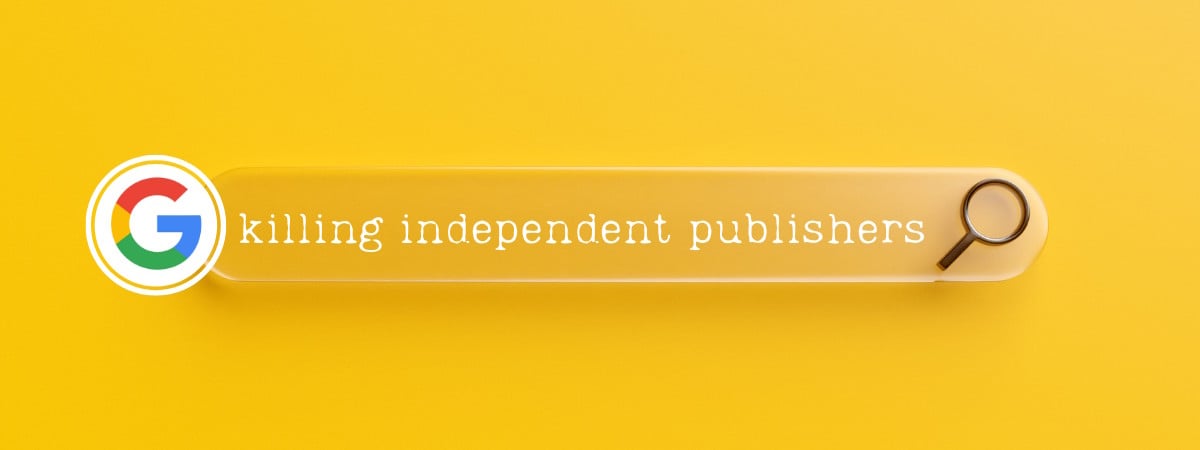
When we launched Digital Citizen in 2015, our goal was to create a free written publication that assists people in achieving their goals when using technology. Since then, we have published thousands of articles, helping people become more productive, troubleshoot problems, and make informed decisions about the products they use and how to use them. Over time, the web has changed significantly, but we've learned to adapt each time. Until recently, our business model, based on display advertising, has helped us build a healthy small business where we do the work we’re passionate about. Unfortunately, things have changed dramatically with the advent of artificial intelligence (AI), and the last year and a half has been particularly difficult, mostly because of Google and how it dabbled with AI. Here’s what's going on:
How Digital Citizen used to work
If you have been reading our work for a while, you know that we publish a variety of tutorials, alongside product reviews, blog posts, and all kinds of geeky analysis. On our site, you can find content for beginners and people who aren’t technical at all, as well as stuff that’s interesting to geeks passionate about gaming hardware, people wanting to build a fast Wi-Fi network or fitness enthusiasts looking for their next smartwatch. Since I love writing about technology, I also authored or co-authored a dozen books, all of which were published internationally. They’re books about Windows, Office and other Microsoft products. My latest book, Windows 11 All-in-One For Dummies, 2nd Edition, was published at the beginning of this year and has received positive feedback from readers. At the time of writing, it’s in the Top 10 best-selling books about Microsoft operating systems on Amazon.com (its position changes daily).
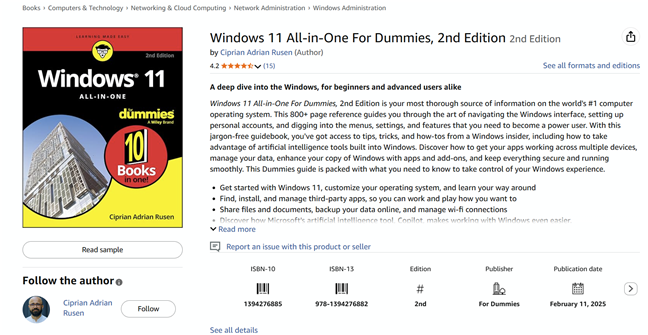
Windows 11 All-in-One For Dummies, 2nd Edition is doing well on Amazon
We had a good run for several years, and our peak was in January 2018, when our site was visited by 1.6 million people. That year, our articles were read by more than 17 million people. It was more than we could ever hope for, and this traffic allowed us to make a living while keeping our content free for everyone and preserving our editorial independence. We monetized our work mostly through the display ads shown on our website. We were never focused on big profits or growing into a media conglomerate. Instead, we’ve always been a small team of just 3 or 4 people, trying to find a balance between showing enough ads to support ourselves and not overwhelming our readers with too much advertising.
We loved our business model because it allowed us to meet our goal of providing free content to everyone, without compromising our values. It gave us the freedom to turn down partnerships with tech companies that didn’t respect our work and our editorial independence. A few brands even refused to send us products for review because we insisted on being honest.
As is always the case on the web, traffic is never constant. Google, Bing, and other search engines have made many changes to their algorithms, but our traffic remained at excellent levels for many years. It started decreasing in the second half of 2021, but it did not threaten our ability to keep doing what we love. Unfortunately, things have changed dramatically since 2024.
What’s going on with Google and the traffic it’s sending to Digital Citizen?
Google launched AI Overviews in the United States in May 2024, and since then, it has gradually rolled it out worldwide. Before this launch, in April 2024, Google sent us 257,494 users, from a total of 618,418 that visited our site that month. Since then, traffic has gone downhill for us at an accelerated pace. As a result, in April 2025, just before Google’s new AI Mode was rolled out in the USA (in May 2025), our traffic had already dropped to 313,780 users and 403,355 views, with only 60,057 people being sent to Digital Citizen by Google. The AI Mode rollout was finalized by Google in June 2025, when our traffic had dropped even lower, to 282,786 users, and 365,134 views, with only 46,462 people being sent to us by Google.
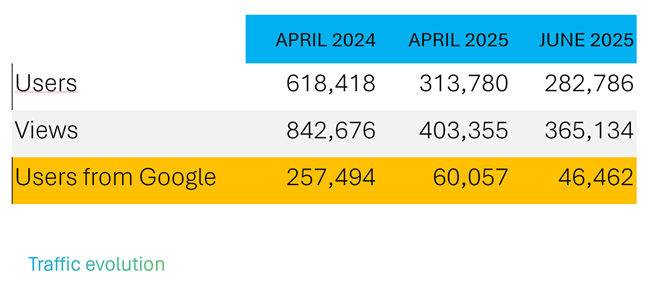
Our traffic evolution
But why did this happen? Well, let’s take as an example one of the articles that used to be popular on Digital Citizen: How to boot Windows 11 in Safe Mode (8 ways). If you’re in the US and search for “boot into safe mode windows 11” on Google, the AI Mode generates a reasonably good answer, which features information from our article, as well as others. AI Mode also recommends three websites on the right side of the search page. For some visitors, the top entry is a link to our article. The other two are from IT Pro and Dell. Other people will see other sources listed here, depending also on the exact words they use for their query and the profile built by Google for each person.
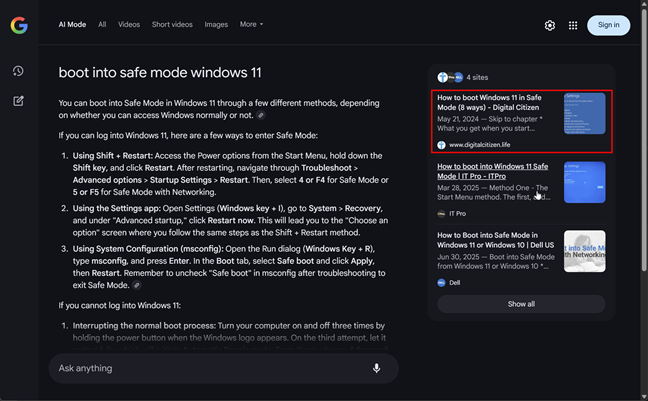
How Google AI Mode works
Unfortunately, most people just read and follow the instructions shared by Google’s AI Mode without ever reaching our website (nor any others in that list). If you’re curious how many people are searching on Google for this topic and visiting our article, here’s a brief comparison: In April 2024, our article was returned as a result of as many as 116,000 searches worldwide, and it received 335 clicks from Google. In April 2025, it was listed as a result of 48,000 searches, and it received 274 clicks. In June 2025, it was shown as a result of 40,700 searches and received just 189 clicks. This trend will worsen as Google AI Mode is released in new countries in the coming months.
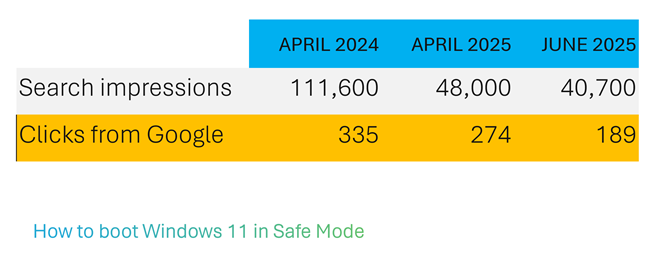
Does Google send us any traffic?
We worked hard to create that article, and it underwent multiple iterations and improvements, making it one of the most comprehensive resources available on this topic. Out of all three articles recommended by AI Mode on the right, ours shares the most methods for booting Windows 11 into Safe Mode, and it’s the only one that offers complete step-by-step instructions together with pictures and thorough explanations. We also have one of the most comprehensive collections of articles on this topic, explaining what Safe Mode is, the various Safe Modes and how they differ, how to exit Safe Mode, and more.
I find it ironic that in their public statements about AI Overviews and AI Mode, Google representatives, as well as the official documentation, repeatedly mention that they send traffic of higher quality, with users more likely to spend more time on the sites they visit. I wanted to verify this, so I reviewed our Google Analytics data. The reports stated that in April 2024, readers sent by Google spent an average of 48 seconds on Digital Citizen during each visit. In April 2025, the duration decreased to 46 seconds, while in June 2025, it lowered to 40 seconds.

Is Google sending high quality traffic?
Where is the higher-quality traffic? Are other websites experiencing similar trends? Is Google intentionally misinforming everyone?
NOTE: If you want to know more about Google’s AI Overviews, its timeline, and impact, I highly recommend this article from Ahrefs.
The worst part: Google isn’t the only one doing this
Unfortunately, our traffic (and that of other publishers) is going to continue to plummet because all companies are using AI to provide answers based on content from publishers and creators, not just Google. For example, Perplexity offers a similar experience to Google’s AI Mode, while ChatGPT is even worse. If you write a prompt for “boot into safe mode windows 11”, ChatGPT provides you with an answer taken from the internet without sharing any references whatsoever. The only positive exception (at least for now) seems to be Microsoft. It implemented Copilot in its Bing search engine in a slightly more ethical manner, which does a better job at promoting content of small publishers like us. Therefore, we haven’t noticed significant traffic drops from Bing, and this search engine has now become our main source of traffic. But because of its low market share, it does not help us reach a wide enough audience to keep living from display advertising.
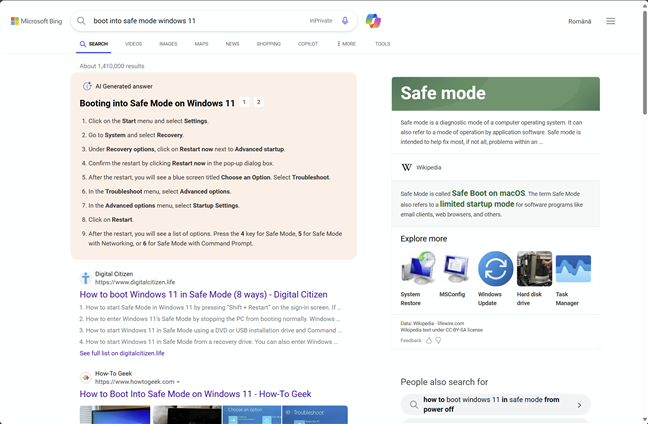
Bing has a more ethical approach to search with AI
I feel that the internet has become a techno-feudal playground for the major players in the AI space, utilizing the work of actual people for the benefit of a small and powerful technological elite. Our content is no longer read by people but misappropriated by all kinds of AIs and used for the profit of a handful of tech companies. And the worst part is that if we block the robots crawling our website to feed all these AIs, it’s like taking ourselves out of the internet. Our work is never going to be discovered and read by the people we wrote it for. So, what do we do?
We’re trying to reinvent ourselves
We’re in a very rough spot. If things continue like this, soon we may have to fire someone from our small team (it’s just three of us working full time), or we may have to close Digital Citizen altogether. Both scenarios are something we want to avoid. We care deeply about our work and about each other as colleagues and friends. To avoid this, we’re trying to reinvent ourselves. Therefore, we started creating video content alongside our written articles, hoping to reach a new audience that doesn’t rely on interacting with AI. We started in May, and we have only a couple of clips posted on our YouTube channel (did you know that Google just announced AI Overviews for YouTube?). We’re not yet skilled at making videos, but we’re learning. Our goal is to post one new video each week, then two, and so on. We’re relatively close to reaching the first goal in this list.
Until we change our business model and are able to earn a living through other means, you can support us by subscribing to our channel and by donating. If you appreciate our work, you can sponsor us directly through the donations system that we recently implemented. Your donations can compensate for some of the revenue that we have lost because of AI. In an ideal world, we would be able to eliminate display advertising entirely, write, and earn a living through subscriptions and donations paid by the people reading us. Wouldn’t that be awesome?
How do you feel about all this AI invading the web?
It’s been a long article and a pessimistic one, too. I don’t like sharing bad news, and I hope that I didn’t dampen your mood. Before closing, I’m curious to know your opinion on this subject: Do you like Google’s AI Overviews and its latest AI Mode? Do you find them useful? If other publishers are reading this, I’m curious to know about their experience: Are you seeing similar trends? How do you plan to survive in this Brave New World? Comment using the options below, and let’s discuss. 🙂


 18.07.2025
18.07.2025 


